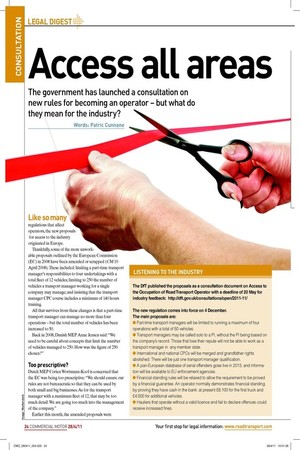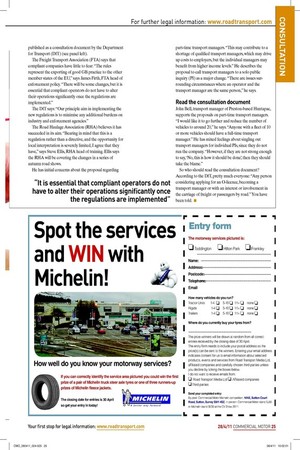Access all areas
Page 18

Page 19

If you've noticed an error in this article please click here to report it so we can fix it.
The government has launched a consultation on new rules for becoming an operator – but what do they mean for the industry?
Words: Patric Cunnane
Like so many
regulations that affect operators, the new proposals for access to the industry originated in Europe.
Thankfully, some of the more unwork able proposals outlined by the European Commission (EC) in 2008 have been amended or scrapped (CM 10 April 2008). These included: limiting a part-time transport manager’s responsibilities to four undertakings with a total leet of 12 vehicles; limiting to 250 the number of vehicles a transport manager working for a single company may manage; and insisting that the transport manager CPC course includes a minimum of 140 hours training.
All that survives from these changes is that a part-time transport manager can manage no more than four operations – but the total number of vehicles has been increased to 50.
Back in 2008, Danish MEP Anne Jensen said: “We need to be careful about concepts that limit the number of vehicles managed to 250. How was the igure of 250 chosen?”
Too prescriptive?
Dutch MEP Corien Wortmann-Kool is concerned that the EC was being too prescriptive: “We should ensure our rules are not bureaucratic so that they can be used by both small and big businesses. As for the transport manager with a maximum leet of 12, that may be too much detail. We are going too much into the management of the company.” Earlier this month, the amended proposals were published as a consultation document by the Department for Transport (DfT) (see panel left).
The Freight Transport Association (FTA) says that compliant companies have little to fear. “The rules represent the exporting of good GB practice to the other member states of the EU,” says James Firth, FTA head of enforcement policy. “There will be some changes, but it is essential that compliant operators do not have to alter their operations signiicantly once the regulations are implemented.” The DfT says: “Our principle aim in implementing the new regulations is to minimise any additional burdens on industry and enforcement agencies.” The Road Haulage Association (RHA) believes it has succeeded in its aim. “Bearing in mind that this is a regulation rather than a directive, and the opportunity for local interpretation is severely limited, I agree that they have,” says Steve Ellis, RHA head of training. Ellis says the RHA will be covering the changes in a series of autumn road shows.
He has initial concerns about the proposal regarding part-time transport managers. “This may contribute to a shortage of qualiied transport managers, which may drive up costs to employers, but the individual managers may beneit from higher income levels.” He describes the proposal to call transport managers to a solo public inquiry (PI) as a major change. “There are issues surrounding circumstances where an operator and the transport manager are the same person,” he says.
Read the consultation document
John Bell, transport manager of Preston-based Huntapac, supports the proposals on part-time transport managers. “I would like it to go further and reduce the number of vehicles to around 20,” he says. “Anyone with a leet of 10 or more vehicles should have a full-time transport manager.” He has mixed feelings about singling out transport managers for individual PIs, since they do not run the company. “However, if they are not strong enough to say, ‘No, this is how it should be done’, then they should take the blame.” So who should read the consultation document? According to the DfT, pretty much everyone: “Any person considering applying for an O-licence, becoming a transport manager or with an interest or involvement in the carriage of freight or passengers by road.” You have been told. ■














































